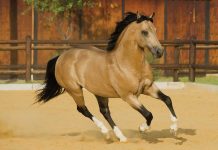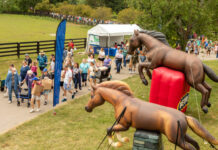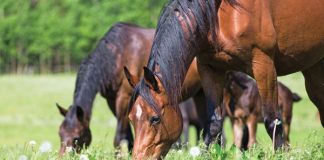Here at Young Rider, we often recommend that new riders buy older horses. Teenaged horses often make the best first mounts. They tend to be more sensible and far more experienced than young horses. They’ve seen more of the world and will help an inexperienced rider become a more confident and capable. Some senior citizen equines are worth their weight in gold!
If you’re the proud owner of an oldie, you know that even though he or she might need more TLC than a younger horse, all of the extra work is worth it. A well-looked after older horse will be your faithful friend for many years.
Let’s look at some things you have to think about when you ride an oldie.

Dental Care
Older horses need regular visits from the equine dentist. He needs his teeth floated at least twice a year. The dentist will be able to tell you if your horse’s teeth are worn down to the gums or if any of his teeth have fallen out.
If his teeth are worn down, it may be hard for him to eat coarse hay or hard pellets. You may have to soak pellets to make a mash and feed him by himself so he doesn’t have to compete with younger, stronger horses for his food.
Senior Feed
If your older horse seems to be losing weight as he ages, switch him to a senior feed. Talk to your vet to see which feed she recommends. Senior feeds contain ingredients that are easy for older horses to digest, including beet pulp, soybean hulls and alfalfa.
Senior feeds contain lots of fiber. They also contain more fat then other types of feed, because your oldie needs lots of calories in his diet. Senior feeds also include special minerals and vitamins that will help keep an older horse healthy.
If your horse is skinny, feed him smaller feeds more frequently. Try to give him three or four small meals a day to help him gain weight.
An older horse can also benefit from eating alfalfa hay. Mix a flake of alfalfa hay in with his grass hay every day and check that he eats all of it.
Supplements
Older horses often benefit from being fed supplements. You could feed him a joint supplement that includes chondroiten or glucosomine. Many supplements containing these substances state that they encourage the growth of new cartilage which will help keep your horse moving easily.
You could also give your horse a high-fat supplement full of calories to help keep weight on him.

Arthritis
Older horses can be a bit stiff when you first hop on them and then they loosen up and feel less lame after you warm them up. Sometimes an older horse has trouble lying down and getting up. This stiffness is usually caused by arthritis.
Arthritis is a condition that affects many older horses. It’s when the tissues and membranes that lubricate the area around a joint (where two bones meet) become swollen and sore, making it difficult for a horse to move freely.
If you suspect that your horse has arthritis, ask the vet to check him out. She may take X-rays of his legs which may show damage to a joint. If your vet says your horse has arthritis, there are many things you can do to help him keep moving.
- Give him regularly exercise. If you don’t ride him, make sure he spends lots of time in a field where he can move around.
- Warm him up properly at the walk before you trot or canter.
- If the arthritis is mild, you may be able to give your horse Phenylbutazone before you ride him. ‘Bute is like aspirin and can relieve a horse’s pain.
- Your vet may inject your horse with corticosteroids, drugs that reduce swelling.
- She may also inject your horse’s arthritic joints regularly with a joint lubricant product such as hyaluronic acid. Hyaluronic acid can help the joints move more easily and your horse will be more comfortable.
This article originally appeared in the September/October 2009 issue of Young Rider Magazine. Click here to subscribe!





